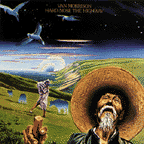
(click on cover image for larger version)  Sample, review, or order this CD now at Amazon.com
Sample, review, or order this CD now at Amazon.com
|
Hard Nose the Highway
Warner Bros. 2712-2
(Released July, 1973)
- Snow in San Anselmo (4:34)
- Warm Love (3:22)
- Hard Nose the Highway (5:14)
- Wild Children (4:20)
- The Great Deception (4:51)
- Bein' Green (4:20)
- Autumn Song (10:37)
- Purple Heather (5:42)
Total time: (43:12)
Musicians:
David Hayes: Bass
Jules Broussard: Horn/Saxophone
Bill Atwood: Harmonica
Marty David: Bass
Jackie DeShannon: Vocal/Vocal (Background)
Joe Ellis: Horn
Nancy Ellis: Strings/Viola
Michael Girling: Violin
Jeff Labes: Piano/Arranger/Keyboards
Gary Malaber: Percussion/Drums
Zaven Malikian: Violin
Zovan Melikian: Strings
Van Morrison: Guitar/Arranger/Keyboards/Saxophone/Vocal/Producer
John Platania: Guitar
Nathan Rubin: Strings
Rick Schlosser: Drums
Jack Schroer: Piano/Arranger/Horn/Saxophone
Neil Schwartz: Engineer
Jim Stern: Engineer
John Tenney: Strings/Violin

(Warner poster/handbill advertising Hard Nose the Highway)
Review by Scott Thomas: 
Hard Nose the Highway is, if anything, even more far-reaching than
the restless St. Dominic's Preview. Here
we find Van probing deeper into esoteric musical forms (from jazz to
traditional Irish folk music) and experimenting with bold, new production
techniques (the chorus in "Snow in San Anselmo," the Big Band arrangement in
"Bein' Green"). This time, however, he overreaches. It's not that he had
gone beyond the limits of his talents. (Veedon
Fleece would dispel any such notion.) Instead, it is simply a matter
of studio technique. The spit and polish that made Tupelo Honey and St. Dominic's Preview
shine was never applied, and what we have is a return to His Band and the Street Choir's
carelessness, though, given this album's lofty intentions, with results that
are far less endearing. Despite the skill of his backing band (listen to
their work on It's Too Late to Stop Now!),
the performances on Hard Nose the Highway are unfocused and
perfunctory, the production flaccid.
Which is not to say the album doesn't have its moments. The opening cut, "Snow in San Anselmo," is a bizarre masterpiece. By embedding a vivid set of lyrics in the most melodramatic context imaginable (i.e. a choral arrangement straight out of The Omen soundtrack and disorienting jazz interludes), Van turns a rare California snowfall into an event with almost mythical implications.
Unfortunately, the next few songs are weak in comparison. "Warm Love" is a pleasant, but insignificant paint-by-numbers love song, "Wild Children" is failed jazz, and "The Great Deception" has the distinction of being Van's worst track since "Chick-A-Boom." "The Great Deception" is essentially a protest song in which the singer rails against the dominance of market forces in popular music and the hypocrisy of its most visible artists. The sheer ineptitude of the music, however, blunts the song's intent. Without a riff, a recognizable melody, or even a strong beat over which to project his anger, Morrison's self-righteous raving comes across as mere blubbering. The targets of his rage are "plastic revolutionaries" like John Lennon and Sly Stone who chant socialist and populist slogans while owning "four or five Cadillacs." Unfortunately, Morrison succeeds only in revealing his own arrogance, pettiness, and capacity for self-pity. Compared to Lennon and Stone, Morrison (who, incidentally, was not exactly starving at this point in his career) sees himself as the "great Rembrandt" who "didn't have enough money for brushes."
The next cut is a welcome change even though it is no less perverse. Joey Raposo's "Bein' Green" is, of course, Kermit the Frog's theme song done up here with an ersatz Big Band arrangement and one of Van's most impassioned vocal performances. While Morrison's access to this song may have begun with Frank Sinatra's version (Sinatra gets a name check on "Hard Nose the Highway"), he was most certainly aware that covering a Muppet was a great way to poke fun at his own hyper-serious public persona.
"Autumn Song" is another elongated piece in the tradition of "Listen to the Lion" and "Almost Independence Day" which, being less dramatic than those earlier cuts, could stand a bit of compression. Still, the stream of autumnal, Sunday afternoon images and the relaxed jazz setting make it a worthwhile listen.
"Purple Heather," the final track, is Morrison's adaptation of the traditional folk ballad "Wild Mountain Thyme." While English and Irish folk influences have always been a part of Van's music, this is the first time he makes a conscious and willful reference. The magic occurs when the singer combines this kind of pastoral romanticism with the physicality of R&B music: Morrison scats, shouts, and wreaks havoc with the meter while Jeff Labes' piano and the Astral Weeks-like string section play echo. By acknowledging this hidden but vital element in his music, Van has opened up whole new vistas for himself. Both the music and scenery of Ireland would figure prominently in Veedon Fleece and in the albums he would create during the 1980's.
Part of the van-the-man.info unofficial website